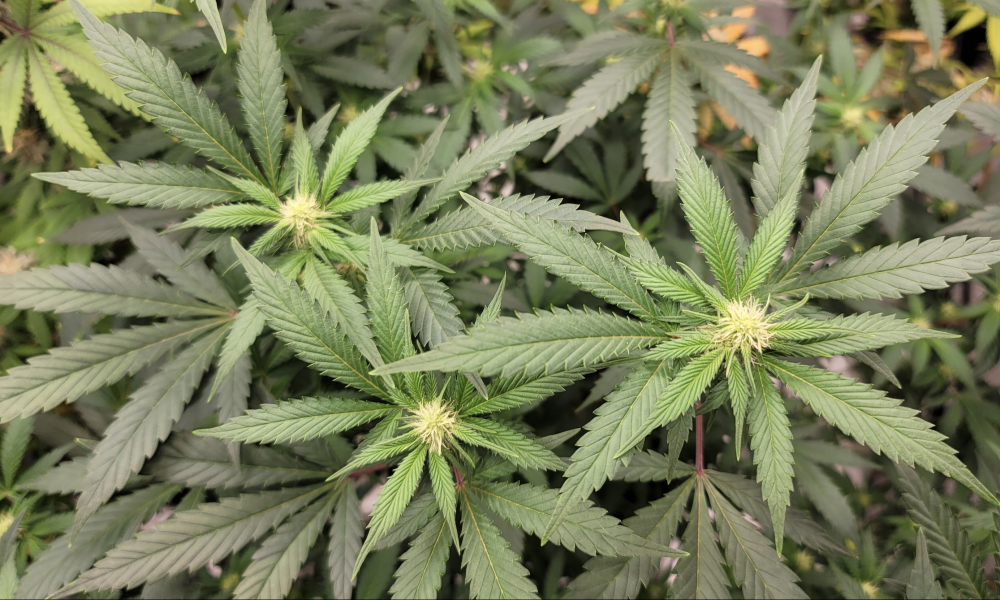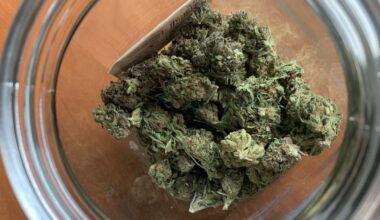New Mexico Gov. Michelle Lujan Grisham (D), who listed cannabis legalization as a top priority last year and called a special legislative session to get it done, was among the first in line last Friday morning when retail stores opened across the state.
“This is a big day for New Mexico!” Lujan Grisham said during a visit to Everest Apothecary in Albuquerque.
The governor left the shop empty handed, noting that she’s never before tried marijuana despite pushing hard for its legalization. But she left open the possibility that she would purchase legal cannabis products at some point.
“Who knows,” she told local NBC affiliate KOB 4. “Today I don’t have to decide, because it’s not ending today. It’s going to stay forever.”
Recreational cannabis sales have begun and New Mexicans are EXCITED!
Thousands of sales have already been made today, with thousands more to come.
We’ve created an incredible opportunity for economic growth in communities across the state, from Sunland Park to Clovis to Raton. pic.twitter.com/bMPy3eAYku
— Governor Michelle Lujan Grisham (@GovMLG) April 1, 2022
Opening day of marijuana sales in New Mexico—what Lujan Grisham at one point called “Cannabis Day”—drew long lines of eager residents and more than a few customers who made the trip from Texas, where the plant remains illegal. Consumers spent more than $2.7 million before stores closed, Lujan Grisham said the following morning.
“Today is, like, the fruition of a ton of work by a lot of incredible people making sure that New Mexicans have access to recreational adult-use cannabis in exactly the way they want,” the governor said during her dispensary visit, “and it’s a huge economic opportunity for the state.”
Purchases of recreational cannabis carry a 12 percent excise tax on top of the state’s 8 percent sales tax. Beginning in 2025, the excise tax is scheduled to increase by 1 percent each year until it reaches 18 percent in 2030.
Sales to adults 21 and older kicked off less than a year after Lujan Grisham signed the Democrat-led legalization bill—a timeline considerably faster than most other jurisdictions have followed.
“That is something that other states couldn’t even think about doing,” Victor Reyes, deputy superintendent of the New Mexico Regulation and Licensing Department, told NM Political Report last week, “and we did it because we knew that it was important from our values perspective, to make sure that recreational cannabis was legalized and done so quickly.”
Although lawmakers failed to pass a legalization bill before the scheduled end of last year’s legislative session, Lujan Grisham convened a special session in March, where Democrats pushed a pair of bills through—one to legalize cannabis and another containing criminal legal reforms, such as provisions to expunge past cannabis convictions.
With over $2.7 million in total cannabis sales on the first day of the recreational adult-use cannabis industry, it’s safe to say that the demand for New Mexico’s newest economic sector is high.
We’re creating jobs and generating tax revenue in communities all across New Mexico.
— Governor Michelle Lujan Grisham (@GovMLG) April 2, 2022
Provisions in the two bills were originally part of a single piece of legislation, HB 12, that passed the House during the regular session but stalled on the Senate floor. Going in to the special session, backers spun off the criminal justice matters in an effort to win support from Republicans and moderate Democrats who complained the proposal as a whole was too broad.
In addition to adults being able to purchase and possess up to two ounces of cannabis, 16 grams of concentrates and 800 grams of infused edibles, the New Mexico law also allows the home cultivation of up to six mature plants for personal use. The plants must be out of sight and secured from children, and cannabis grown for private use can’t legally be sold or bartered.
New Mexico has championed small business owners and opportunities throughout the recreational cannabis process. Of the newly licensed 63 recreational cannabis producers, 33 of them are micro businesses, proving NM’s commitment to uplift the backbone of our economy!
— Democratic Party of New Mexico (@NMDEMS) April 3, 2022
Lujan Grisham’s office said in a press release on the first day of legal sales that the state has licensed “nearly 100 minority-owned cannabis businesses and nearly 100 women-owned cannabis businesses across New Mexico so far, with some overlap.”
“This is a historic day for New Mexico—the beginning of a new economic opportunity for entrepreneurs and communities across the state,” the governor said. “We are a state focused on growing an economy that attracts and retains young people—and what could be more exciting than a new industry that presents so many unique opportunities.”
As in nearly all of the country, law enforcement in New Mexico have disproportionately arrested and criminally charged people of color with cannabis crimes. Black people, for example, were about four times more likely to be arrested for marijuana possession than white people in 2018, according to data published by ACLU.
.@Michelle4NM and our Dem legislators understand that the previous War on Drugs policies came at a severe cost to people of color and our youth. That’s why they’ve been fighting to expunge the records of 155,000 New Mexicans with previous cannabis convictions.
— Democratic Party of New Mexico (@NMDEMS) April 2, 2022
Late last month, the state entered an intergovernmental agreement with the Pueblos of Picuris of Pojoaque, allowing the tribes to regulate their own marijuana enterprises within their communities and apply for state licenses for any business conducted outside of tribal lands. The Pueblo of Picuris had previously accused the state of a discriminatory double standard following the raid of a small home cannabis garden on tribal territory within New Mexico.
Lujan Grisham included cannabis legalization as part of her 2021 legislative agenda and repeatedly spoke about the need to legalize as a means to boost the economy, especially amid the coronavirus pandemic. She said during a State of the State address in January 2021 that “a crisis like the one we’ve experienced last year can be viewed as a loss or as an invitation to rethink the status quo—to be ambitious and creative and bold.”
Polling indicated New Mexico voters were ready for the policy change. A survey released in October 2019 found a strong majority of residents in favor of legalization with social equity provisions in place, and about half in support of decriminalization of drug possession more broadly.
Legalizing cannabis is expected to create 11,000 good-paying jobs in New Mexico. With thousands of New Mexicans joining the cannabis workforce, from the licensure to the retailing sector, legalizing recreational cannabis is a win for New Mexicans.
— Democratic Party of New Mexico (@NMDEMS) April 1, 2022
Additional pressure to end cannabis prohibition came from neighboring Arizona, where sales officially launched in January of last year. To New Mexico’s north is Colorado, one of the first states to legalize for adult use.
New Mexico’s House in 2019 approved a legalization bill that included provisions to put marijuana sales mostly in state-run stores, but that measure died in the Senate. Later that year, Lujan Grisham created a working group to study cannabis legalization and issue recommendations.
Before the start of last year’s legislative session, the governor signaled she was considering actively campaigning against lawmakers who blocked her legalization bill in 2020. She also said that she was open to letting voters decide on the policy change via a ballot referendum if lawmakers didn’t send a legalization bill to her desk.
White House Won’t Say If Biden Supports Federal Marijuana Legalization Bill Passed By House
Photo courtesy of Mike Latimer
Medical Disclaimer:
The information provided in these blog posts is intended for general informational and educational purposes only. It is not a substitute for professional medical advice, diagnosis, or treatment. Always seek the advice of your physician or other qualified healthcare provider with any questions you may have regarding a medical condition. The use of any information provided in these blog posts is solely at your own risk. The authors and the website do not recommend or endorse any specific products, treatments, or procedures mentioned. Reliance on any information in these blog posts is solely at your own discretion.







